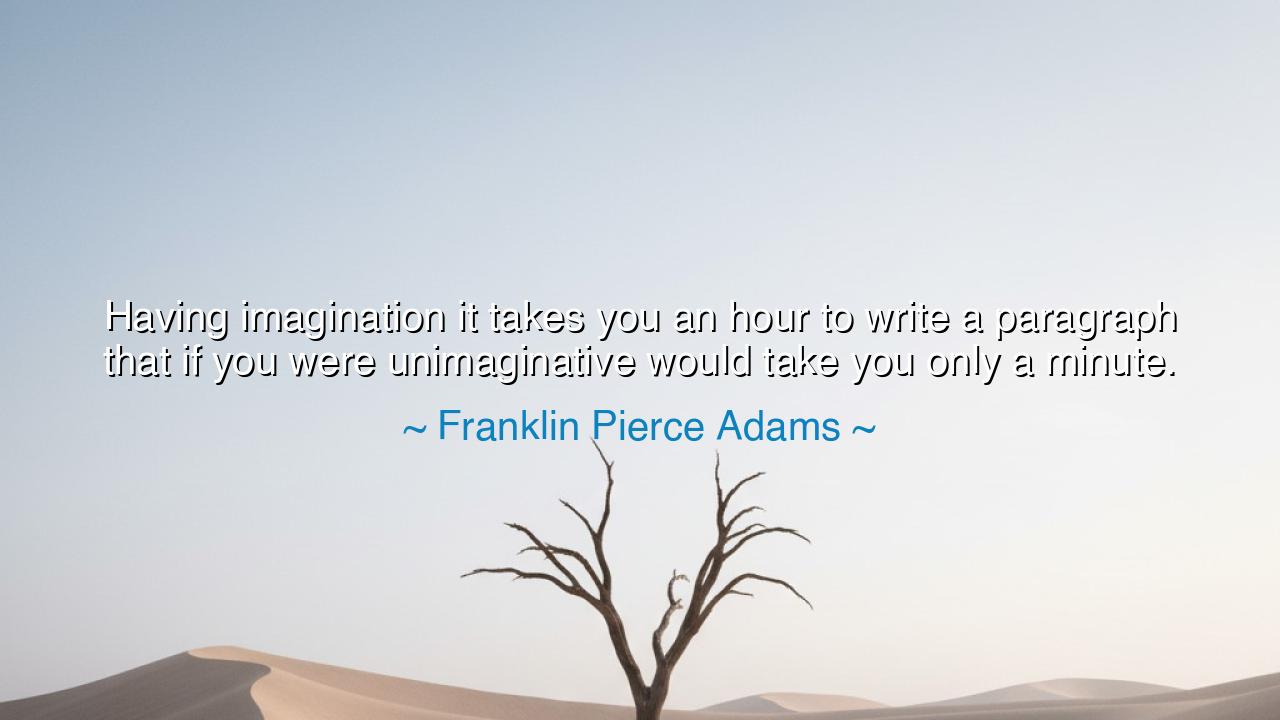
Having imagination it takes you an hour to write a paragraph that
Having imagination it takes you an hour to write a paragraph that if you were unimaginative would take you only a minute.






“Having imagination it takes you an hour to write a paragraph that if you were unimaginative would take you only a minute.” Thus spoke Franklin Pierce Adams, the wry American essayist and humorist, whose pen captured both the charm and the torment of the creative mind. Beneath the wit of his words lies a truth that all artists, thinkers, and dreamers know well — that imagination, though a gift divine, is no easy companion. It demands of its bearer a greater depth of seeing, a greater labor of shaping, and a greater burden of care. The unimaginative may move swiftly through the surface of things, but the imaginative must linger, searching for meaning beneath every word.
In these words, Adams reminds us that the act of creation is not measured in speed, but in depth. The imagination, once awakened, refuses to be satisfied with what is easy or immediate. Where others see a single phrase, the imaginative mind sees infinite possibilities — shades of tone, layers of emotion, whispers of rhythm. Each sentence becomes a universe waiting to be ordered, each paragraph a living thing that must breathe, pulse, and sing. Thus, what might take a minute for the hurried mind may take an hour, or a lifetime, for the one who feels deeply. The cost of imagination is patience, but the reward is truth.
Franklin Pierce Adams, though often light in his humor, knew the gravity of this creative struggle. As a columnist and poet in the early twentieth century, he wrote not to fill pages but to illuminate them. His words were carved with precision, his wit sharpened by imagination, not haste. Through his quote, he reveals a paradox that has haunted creators of every age: that imagination slows the hand even as it quickens the mind. The artist is caught in a sacred tension between vision and expression, seeing more than can ever be said, and spending hours trying to say it well.
The ancients, too, understood this sacred burden. The poet Homer, in his blindness, carried within him entire worlds — the roar of battle, the lament of heroes, the voice of gods. To summon these into song was not a swift act, but a labor of spirit. Likewise, Leonardo da Vinci, possessed by unending imagination, could spend years perfecting the smile of a single figure, haunted by the endless possibilities that only he could see. The imaginative creator is never content with the first vision, for he knows that truth has many faces, and beauty many forms. Thus, he lingers, refines, and returns — a servant to his own divine restlessness.
To be imaginative is to live in a world where nothing is simple. A paragraph becomes a landscape; a word becomes a heartbeat. The writer with imagination hears music in the rhythm of syntax, feels the temperature of a sentence, sees colors in the sound of vowels. What for others is mere expression becomes, for him, creation. Yet this intensity is both blessing and curse. For the imagination, like a flame, burns as it illuminates. It devours time and peace, but in exchange, it gives the world something eternal — words that breathe, ideas that endure.
Consider the story of Charles Dickens, who was said to walk for miles through London’s foggy streets before writing a single line. He needed to feel the pulse of the city, to let the imagination absorb its sorrow and laughter, before he could transform it into art. Each of his novels, though written in ink, was born from countless invisible hours of wandering, wondering, and weighing. So it is with every creator touched by imagination — the work we see is but the surface; beneath it lies a sea of unseen struggle.
And yet, from this struggle comes the greatest truth of Adams’ saying: that the time spent in imagination is never wasted. For while the unimaginative may write quickly, their words fade as swiftly as they are formed. But the imaginative, though slow, leaves behind something lasting — a creation imbued with depth, texture, and soul. The imagination, though it delays the hand, perfects the heart. It transforms mere craft into art, and mere thought into revelation.
So, my friends, let this be your lesson: do not envy the swift, nor despise the patient hour. When your imagination leads you through the labyrinth of creation, follow it without fear. Linger over your words, your dreams, your deeds, until they ring true. For it is not the speed of the work, but the spirit within it, that endures. As Franklin Pierce Adams teaches, the cost of imagination is time — but its reward is eternity. Better to write one paragraph in an hour that stirs the soul than a hundred in a minute that vanish like dust upon the wind.






AAdministratorAdministrator
Welcome, honored guests. Please leave a comment, we will respond soon